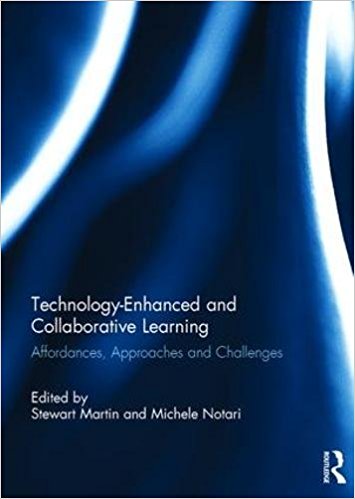Technology-Enhanced and Collaborative LearningAffordances, approaches and challenges
Stewart Martin, Michele Notari
,
|

|
 Diese Seite wurde seit 7 Jahren inhaltlich nicht mehr aktualisiert.
Unter Umständen ist sie nicht mehr aktuell.
Diese Seite wurde seit 7 Jahren inhaltlich nicht mehr aktualisiert.
Unter Umständen ist sie nicht mehr aktuell.
 Zusammenfassungen
Zusammenfassungen
 Technology-enhanced, collaborative and blended learning settings can promote more effective approaches to teaching, learning and assessment when context, agency and individual characteristics are taken into account. This book presents critical insight into the theoretical and practical progress made towards establishing effective, valid and reliable strategies for using and evaluating such approaches, and the challenges and implications of doing so.
Technology-enhanced, collaborative and blended learning settings can promote more effective approaches to teaching, learning and assessment when context, agency and individual characteristics are taken into account. This book presents critical insight into the theoretical and practical progress made towards establishing effective, valid and reliable strategies for using and evaluating such approaches, and the challenges and implications of doing so.
Topics explored include technology-enhanced learning and student evaluations; student engagement and the perception of teaching quality; instructional design and assessment strategies; blended network and mobile technologies for enriching learning and for monitoring and assessment; and the motivations of students to engage with evaluation. Contributors examine issues such as the underlying variabilities in student evaluation of teaching; the implications of inherited cultural and pedagogic practices for educators using collaborative and blended learning; and the international empirical progress in research to understand and measure interactions between cognition, successful learning, and individual difference in technology-augmented settings.
This book will be an essential resource for international researchers and undergraduate and postgraduate students wishing to gain a deeper understanding of the leading perspectives and insights into technology enhanced, blended and collaborative learning, as well as for practitioners and policy makers interested in technology applications in education and training in varied pedagogical and cultural settings. This book was originally published as a special issue of Educational Research and Evaluation.
 Dieses Buch erwähnt ...
Dieses Buch erwähnt ...
 Bibliographisches
Bibliographisches 
 Beat und dieses Buch
Beat und dieses Buch
Beat hat dieses Buch während seiner Zeit am Institut für Medien und Schule (IMS) ins Biblionetz aufgenommen. Er hat dieses Buch einmalig erfasst und bisher nicht mehr bearbeitet. Beat besitzt weder ein physisches noch ein digitales Exemplar. Aufgrund der wenigen Einträge im Biblionetz scheint er es nicht wirklich gelesen zu haben. Es gibt bisher auch nur wenige Objekte im Biblionetz, die dieses Werk zitieren.











 Affordance
Affordance Lernen
Lernen Motivation
Motivation Technologie
Technologie



 Biblionetz-History
Biblionetz-History